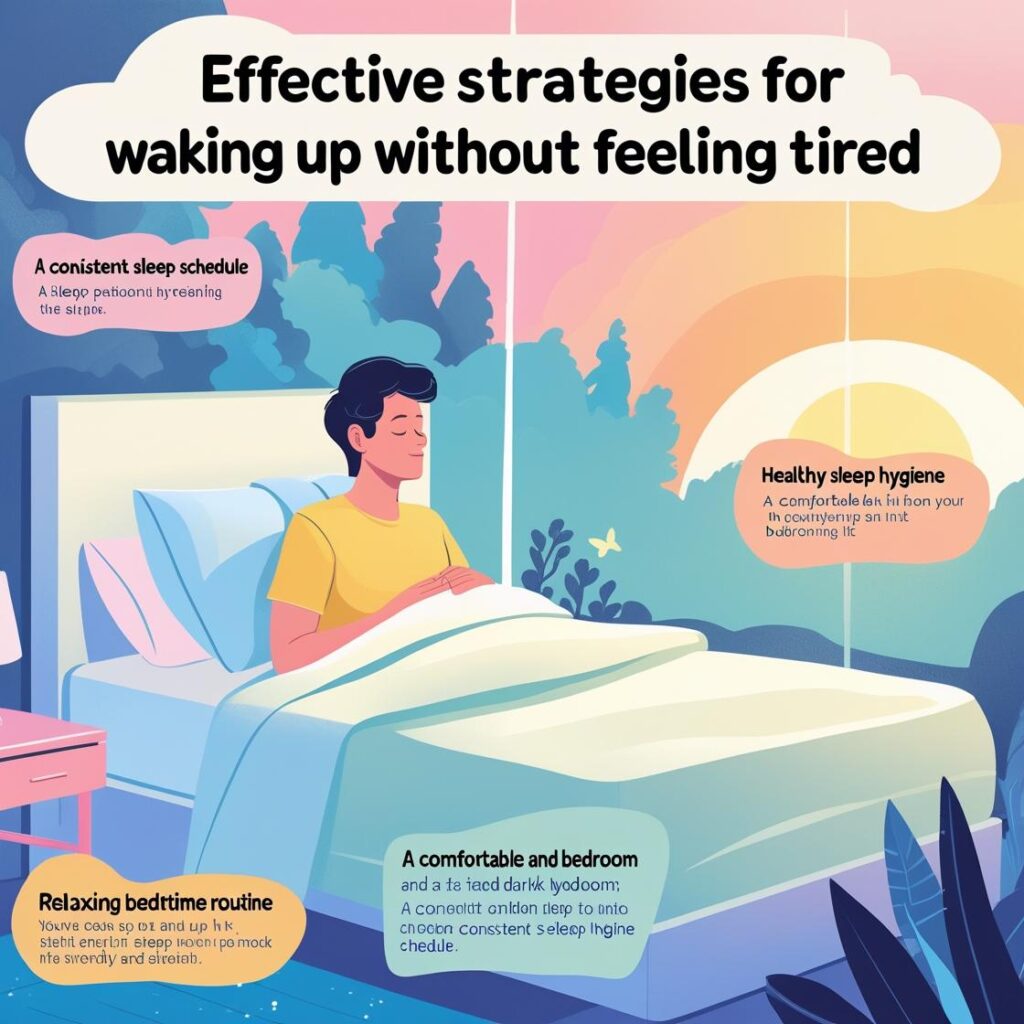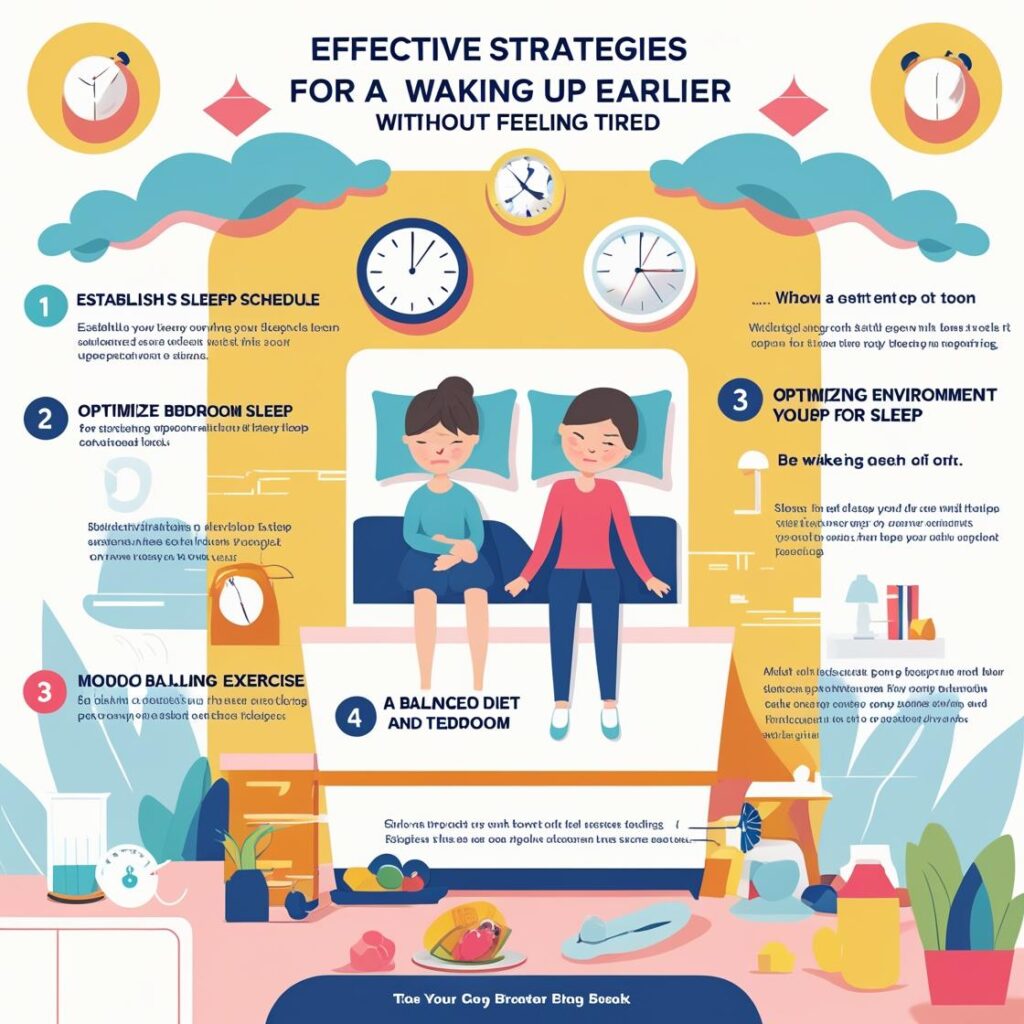Waking up earlier can unlock more productive hours in your day, support better mental clarity, and give you time to focus on personal goals before daily obligations kick in. However, for many, the challenge isn’t just getting up early—it’s doing so without feeling groggy, fatigued, or drained. This guide walks you through practical, science-backed strategies to help you become an early riser who wakes up refreshed and energized.
اقرأ أيضاً: قائمة بأهم 10 كورسات مجانية في الذكاء الاصطناعي مع الروابط المباشرة
1. Understand Your Sleep Cycles
Your sleep is structured in cycles of approximately 90 minutes, transitioning through light, deep, and REM stages. Waking up in the middle of a deep sleep phase can leave you disoriented and tired.
اقرأ أيضاً: كيفية الحصول على منحة دراسية مجانية
To avoid this:
اقرأ أيضاً: كيف تتفوق في أي مقابلة عمل: 10 نصائح من الخبراء
- Use a sleep calculator to determine optimal bedtimes based on your desired wake-up time.
- Aim for 7.5 to 9 hours of sleep, or 5 to 6 full cycles.
- Use apps or devices that track sleep patterns and wake you during lighter sleep stages.
2. Gradually Adjust Your Sleep Schedule
Sudden changes to your sleep routine can confuse your internal body clock, known as the circadian rhythm. Gradual shifts yield more lasting success.
اقرأ أيضاً: كيف توفر 1000 دولار في 30 يومًا
Tips to ease into an earlier wake-up:
اقرأ أيضاً: كيفية كتابة سيرة ذاتية متميزة
- Shift your bedtime and wake time by 15–30 minutes earlier every few days.
- Stay consistent with your wake-up time, even on weekends.
- Avoid napping in the late afternoon or evening, as it can disrupt night sleep.
3. Create a Consistent Bedtime Routine
Establishing a predictable nighttime routine signals your brain that it’s time to wind down. This helps you fall asleep faster and wake up more naturally.
اقرأ أيضاً: كيف تحول عملك الجانبي إلى مشروع بدوام كامل
A solid bedtime routine may include:
اقرأ أيضاً: كيفية تسريع الكمبيوتر المحمول البطيء في 10 دقائق
- Turning off screens at least an hour before bed.
- Engaging in calming activities like reading, light stretching, or meditation.
- Keeping lights dim and room temperature cool to promote melatonin production.
4. Use Light to Reset Your Internal Clock
Natural light is a primary cue for regulating your circadian rhythm. Exposure at the right times can help you shift your sleep patterns.
اقرأ أيضاً: كيف تبني روتينًا صباحيًا يعمل بالفعل
To leverage light exposure:
اقرأ أيضاً: كيف تبدأ مدونة تقنية من الصفر
- Open blinds or step outside shortly after waking up.
- Avoid bright screens at night or use blue light filters.
- Consider a sunrise alarm clock that simulates morning light.
5. Optimize Your Sleep Environment
Your bedroom setting plays a major role in sleep quality. Creating a space conducive to rest improves your chances of waking up refreshed.
اقرأ أيضاً: كيف تبدأ الرسم (حتى لو كنت تعتقد أنك لا تستطيع)
Optimize your sleep setting with:
اقرأ أيضاً: كيف تخطط لعطلة عائلية سيحبها الجميع
- A comfortable mattress and pillow suited to your body.
- Blackout curtains or a sleep mask to block out light.
- White noise machines or earplugs to minimize disruptive sounds.
6. Be Mindful of Diet and Caffeine Intake
What you eat and drink before bed significantly impacts your ability to fall and stay asleep.
اقرأ أيضاً: كيف تتعلم الجيتار بنفسك
Consider these dietary habits:
اقرأ أيضاً: كيف تحزم خفيفًا لرحلة لمدة أسبوعين
- Avoid caffeine after 2 PM to prevent late-night alertness.
- Skip heavy or spicy meals close to bedtime.
- Opt for light snacks like bananas or almonds if you’re slightly hungry.
7. Incorporate Morning Movement
Physical activity, even light movement in the morning, can boost alertness and signal your body that it’s time to start the day.
اقرأ أيضاً: كيف تكتب أول قصة قصيرة لك
Effective morning movement includes:
اقرأ أيضاً: كيف تسافر عبر أوروبا بميزانية محدودة
- Stretching or yoga to improve circulation.
- A brisk walk or short workout session.
- Deep breathing or body scans to awaken your senses.
8. Set Clear Morning Goals
Waking up early becomes easier when you have a purpose. A structured morning routine can add meaning to those extra hours.
اقرأ أيضاً: كيف تحمي خصوصيتك على الإنترنت: دليل المبتدئين
To set your morning up for success:
اقرأ أيضاً: كيف تبدأ في التأمل حتى لو كنت متشككًا
- Plan your first activity the night before (e.g., journaling, reading, or working on a personal project).
- Set out clothes or prep breakfast in advance.
- Avoid jumping straight into work; ease into the day with intention.
9. Monitor and Adjust
Track your progress and adjust your strategy as needed. What works for someone else might not work for you.
اقرأ أيضاً: كيف تساعد الأطفال على بناء عادات دراسية أفضل
Monitoring ideas:
اقرأ أيضاً: كيفية العثور على الجواهر الخفية في أي مدينة
- Keep a sleep journal to track patterns and note what improves or hinders your sleep.
- Use apps or wearable tech to gather data on your sleep cycles and wake-up times.
- Be flexible—some trial and error is expected.
10. Avoid the Snooze Button
While it may seem harmless, hitting snooze disrupts your wake-up process and can make you feel groggier.
Instead of snoozing:
- Place your alarm across the room so you must physically get up.
- Choose a pleasant but effective alarm sound.
- Pair your alarm with an immediate activity, like opening your curtains or drinking a glass of water.
Waking up earlier doesn’t have to mean sacrificing energy or alertness. By making gradual changes and supporting your sleep with smart routines, you can rise early and feel great doing it.




